Iraq conflict: US deploys 275 'military personnel'
- Published
Iraqi forces have hit back with air strikes near Tal Afar as the BBC's John Simpson reports
Up to 275 US "military personnel" are being sent to Iraq to provide security for the US embassy in Baghdad and other personnel, the White House says.
The personnel will assist in the temporary relocation of some staff from the US embassy in Baghdad.
Fighters from the militant Sunni group ISIS have seized a number of Iraqi towns and cities in the past week.
Separately the US says it is willing to discuss with Iran what measures can halt the advance of the ISIS rebels.
However correspondents say that American officials have been quick to dismiss reports of military collaboration.
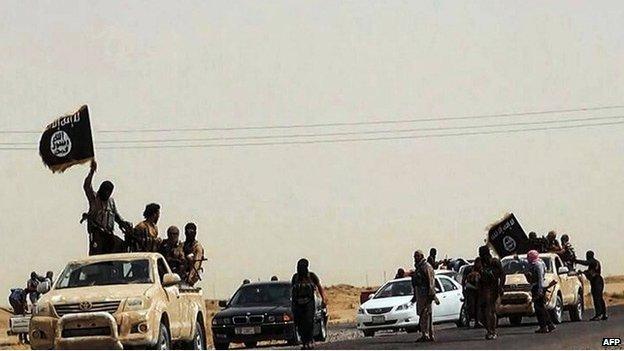
Fighters said to be from ISIS are seen in Salahuddin province where they allegedly massacred Iraqi soldiers
Speaking on Monday to Yahoo News, Secretary of State John Kerry said that Washington would "not rule out anything that would be constructive" while emphasising that any cooperation with Iran would be conducted on a "step-by-step" basis.
The UN says that Islamic State in Iraq and the Levant (ISIS) rebels have carried out hundreds of summary executions.
Human rights chief Navi Pillay said that systematic killings in the north of the country "almost certainly amounted to war crimes".
Her remarks came as the militants, led by ISIS, were reported to have seized the strategic city of Tal Afar.
Heavy fighting is also reported in Baquba, the provincial capital of Diyala province, on the north-eastern approaches to the capital. Rebels are reported to have taken over several quarters and captured the main police station, seizing many weapons.
Nechirvan Barzani, prime minister of Iraq's autonomous Kurdish region: "There is no trust right now"
The rebels occupied several key cities last week, but some towns were retaken.
Security in Baghdad has been stepped up after the insurgents threatened to march on the capital.
Special forces mission
The White House statement said that the main role of the 275 military personnel will be to help embassy staff to relocate to US consulates in Basra and Irbil.
It added that 100 personnel would provide airfield management and security.
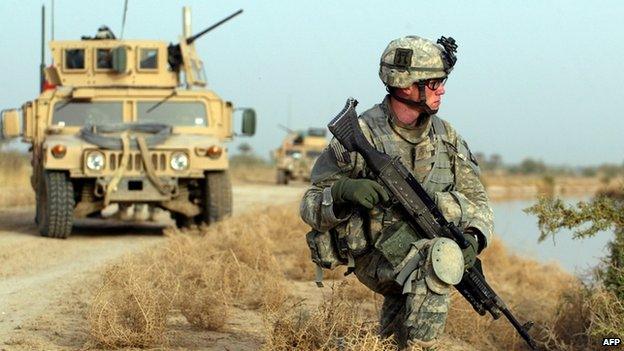
US troops began pulling out of Iraq in 2009
"These US military personnel are entering Iraq with the consent of the government of Iraq," the statement said.
"The US embassy in Baghdad remains open, and a substantial majority of the US embassy presence in Iraq will remain in place and the embassy will be fully equipped to carry out its national security mission."
American officials quoted by the AP news agency have said that there is also a possibility of a limited special forces mission being deployed to train and advise demoralised Iraqi troops, although such a move has not yet been been given the go-ahead.
Reports meanwhile have emerged that an army helicopter was shot down in fierce clashes near the city of Falluja, located just 70km (45 miles) west of Baghdad.

Lightning advance
Ms Pillay's comments came after Sunni militants posted photos online appearing to show fighters massacring Iraqi soldiers.
In a video circulated online, ISIS fighters were also seen taunting captured troops with threats of decapitation.
The Iraqi military earlier said the pictures were real, but their authenticity has not been independently confirmed. The US condemned them as "horrifying".
The insurgents' lightning advance began last week with their capture of the cities of Mosul and Tikrit.
Fighting in Tal Afar began on Sunday, with mortar shelling of some districts as the militants tried to enter the city in Nineveh province.
Tal Afar, which has a mixed Sunni and Shia population, lies between Mosul and the Syrian border.
The city of 200,000 people was taken just before dawn on Monday, Mayor Abdulal Abdoul told the Associated Press news agency.
Eyewitnesses said militants in pick-up trucks mounted with machine guns and flying black jihadist banners were roaming the streets as gunfire rang out.
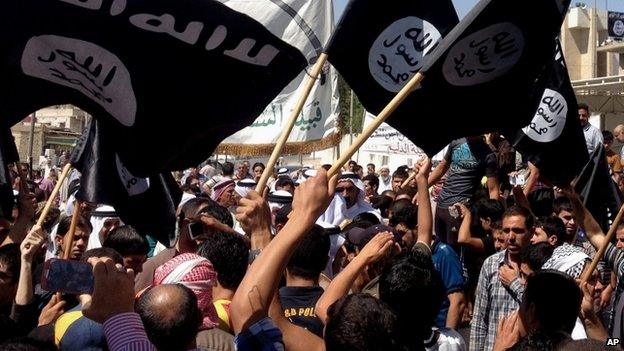
ISIS supporters have taken to the streets in the recently captured city of Mosul
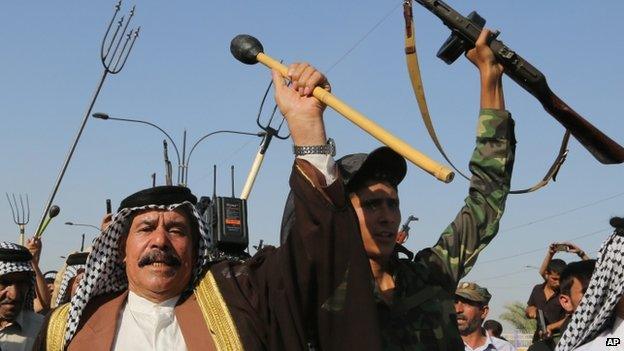
In Baghdad members of Shia community also took to the streets in protest against ISIS
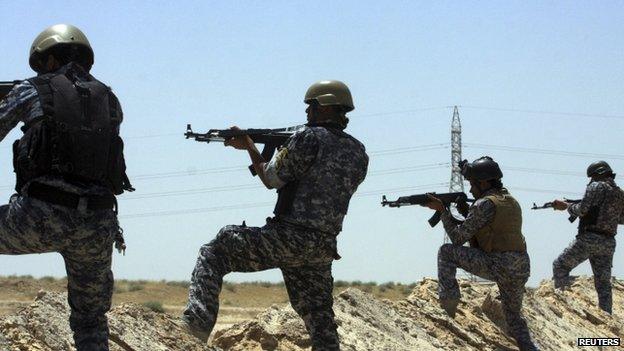
The Iraqi army has been in training in preparation for a fight back against ISIS
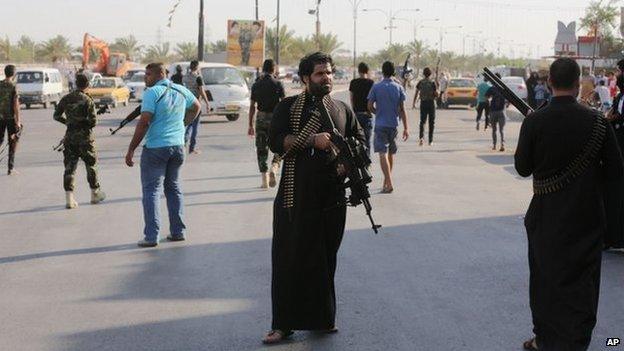
Security has been noticeably stepped up in the capital, Baghdad
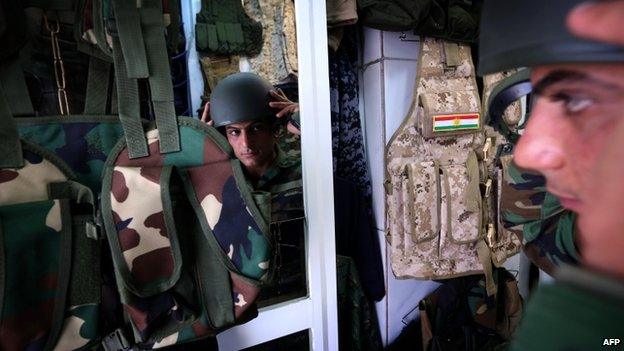
Hundreds of Iraqi volunteers have signed up for military service in recent days
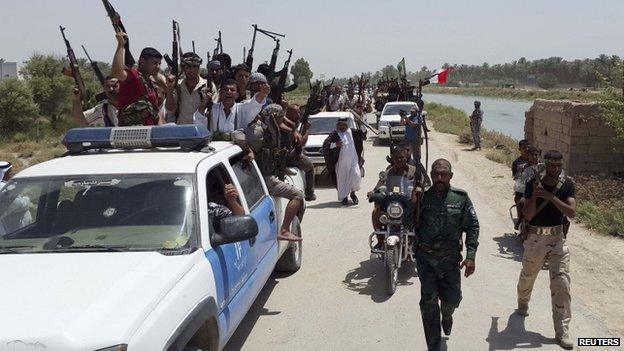
Tribal fighters, like these in Diyala province, have also joined Iraqi forces in the battle against the militants
But the government insists it still largely controls the town and that ISIS fighters would be swiftly dealt with, says the BBC's Jim Muir in northern Iraq.
The prime minister of Iraq's autonomous Kurdish region has told the BBC he doesn't believe the country will stay together.
Nechirvan Barzani said it would be impossible for Iraq to return to the situation that existed before Sunni militants took control of the city of Mosul last week.
The government on Monday said it had "regained the initiative" against an offensive by Sunni rebels.
The defence ministry released footage on Monday which it said was of air strikes on ISIS targets north of Baghdad, including on Mosul and Samarra.
Footage released by the Iraqi Ministry of Defence is said to show strikes on ISIS targets north of Baghdad on Sunday
The US earlier announced it might use drone strikes to halt the ISIS advance.
The USS George HW Bush aircraft carrier has already been deployed to the Gulf, accompanied by two more warships.
Britain reiterated on Monday that it had no plans for military intervention in Iraq.

ISIS in Iraq
ISIS has 3,000 to 5,000 fighters, and grew out of an al-Qaeda-linked organisation in Iraq
Joined in its offensives by other Sunni militant groups, including Saddam-era officers and soldiers, and disaffected Sunni tribal fighters
ISIS has exploited the standoff between the Iraqi government and the minority Sunni Arab community, which complains that Shia Prime Minister Nouri Maliki is monopolising power
The organisation is led by Abu Bakr al-Baghdadi, an obscure figure regarded as a battlefield commander and tactician